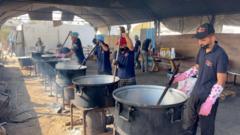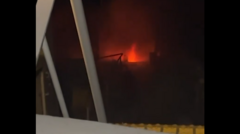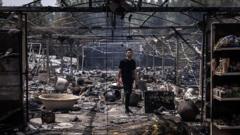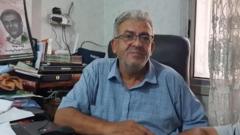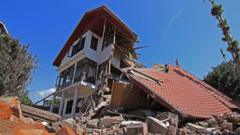In a sobering account, Jumaa Zawayda, a 66-year-old resident of the Jenin refugee camp, describes his battle against displacement following Israeli military operations that have razed homes in the camp. Forced to flee under threat, Jumaa returned briefly to retrieve cherished belongings including his dog and ID card, but fears for his and his family's future as the destruction of homes continues unabated.
Struggle and Resilience: The Plight of Displaced Families in Jenin
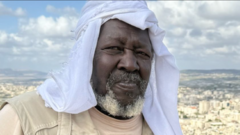
Struggle and Resilience: The Plight of Displaced Families in Jenin
As Israel intensifies demolitions in the West Bank, residents recount their harrowing experiences and fight to reclaim their homes amidst ongoing turmoil.
On a stark hill overlooking the devastated Jenin refugee camp, 66-year-old Jumaa Zawayda stands in anguish, gazing at what was once his home. After being forcibly ordered by Israeli soldiers to evacuate along with 20,000 other residents, Jumaa resolutely decided to remain—determined to protect his family home from destruction. "I wanted to be there to stop it from being damaged," he recalls, as the sounds of gunfire and explosions filled the air during those harrowing days of his existence in refuge.
Three months later, Jumaa, a father of nine and former construction worker, is displaced in a university dormitory after spending time in a school shelter. He is among many in Jenin struggling with uncertainty; the Israeli military's operations have left them barred from returning home, with many buildings demolished without warning. "Some folks have mentioned that our home might be gone, but we just don't know for sure," he says, his emotions palpable.
Displacement in the region escalated during Israel's aggressive military campaign that predates the recent Gaza conflict. The Jenin camp has long seen rising tensions fueled by the presence of armed groups, including Hamas and Palestinian Islamic Jihad. Local journalists note approximately 150 fighters were operating within the camp before intensified military action commenced, leading to increasing Israeli crackdowns.
Israeli forces, dubbing the camps "nests of terror," have engaged in systematic demolitions, with reports indicating that at least 260 buildings—housing around 800 apartments—have been destroyed since the start of “Operation Iron Wall.” The United Nations' Palestinian refugee agency, UNRWA, estimates a staggering 42,000 Palestinians now displaced due to these operations, drawing attention to the unprecedented scale of forced displacements since 1967.
Jumaa recalls the brief opportunity he had to return to his residence, retrieving only his beloved family dog and his UN refugee card. Excitement mingled with dread as he learned his home would likely be among the structures slated for destruction. “Why me? I was not affiliated with militancy. I just wanted to make a living,” he laments.
As alum of humanitarian agencies warn of the dire situation in Jenin, local officials voice their frustrations. Jenin's mayor highlights the prohibition against entering the camp, complicating efforts to provide essential services. Meanwhile, the Israeli government's intention to sustain military presence seems unabated, aiming to inhibit Palestinian residents’ return.
Despite the ravaging of his past, Jumaa's spirit is undeterred. “If they deny me the chance to rebuild, I will set up a tent right there,” he declares resolutely. The shadows of 1948’s displacement linger in his memory, as he grapples with the fear of another round of forced eviction. "We have been uprooted once; must we endure this yet again?" he questions, echoing the plight of countless other Palestinian families yearning for stability and home.




